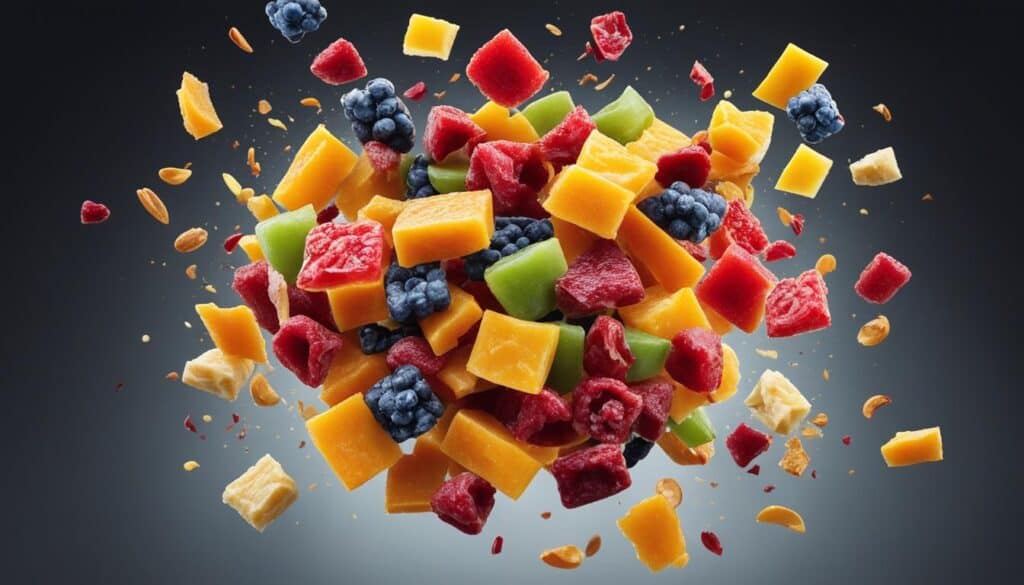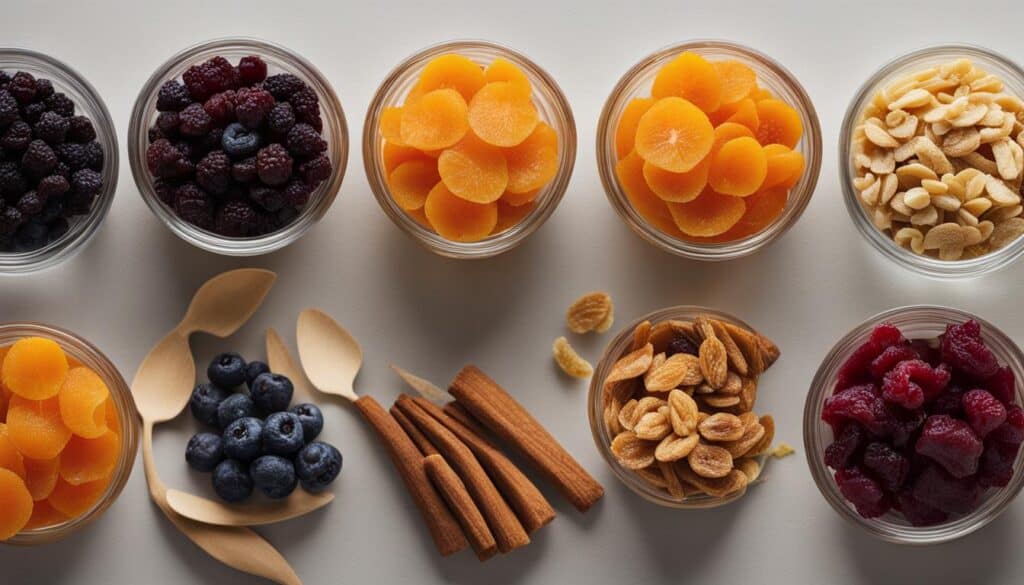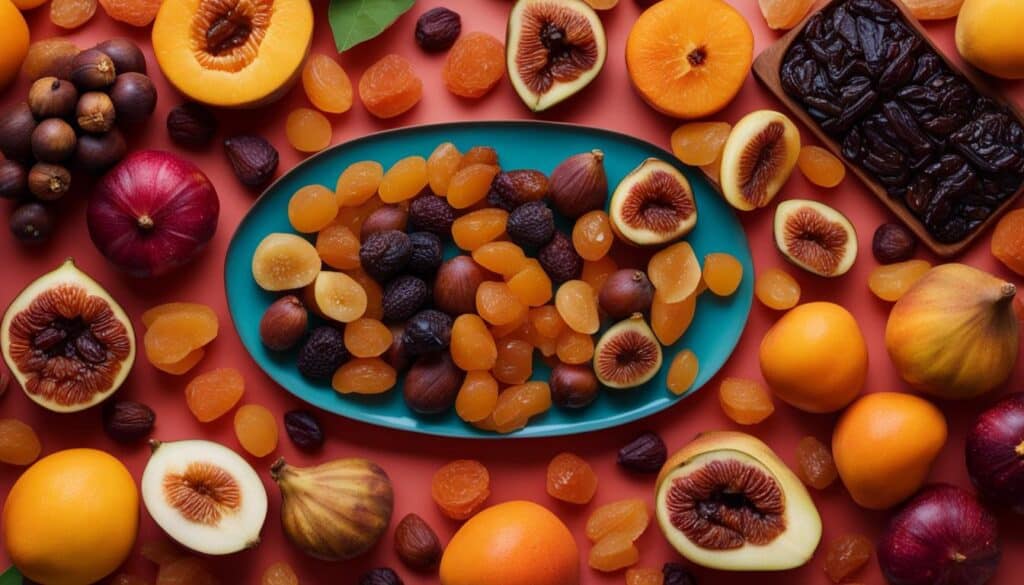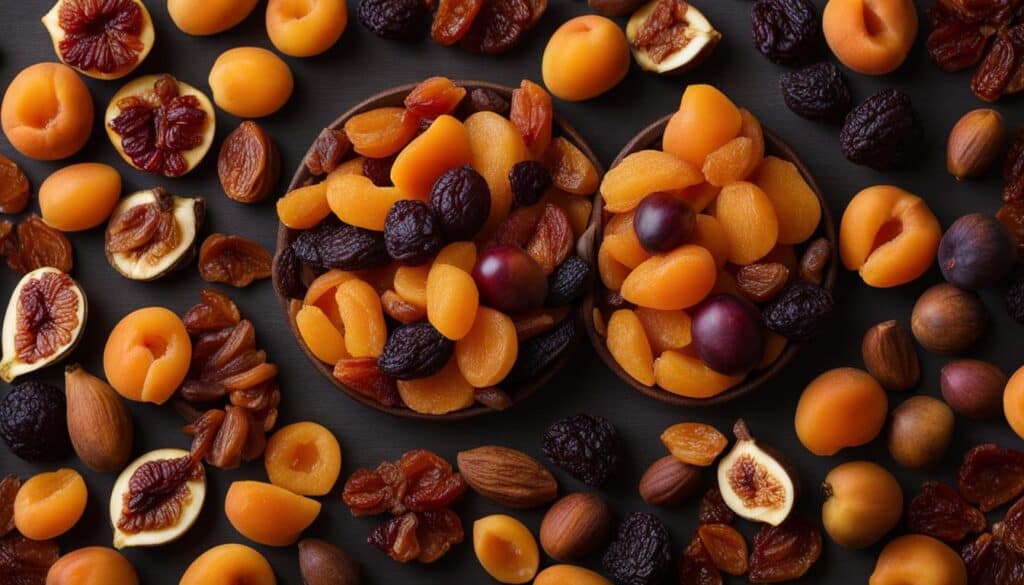When it comes to the sugar content of dried fruit, there are many misconceptions that need to be cleared up. People often assume that dried fruit has more sugar than fresh fruit, but the truth is a bit more nuanced. In this article, I will separate myths from facts and shed light on the sugar content of dried fruit compared to fresh fruit. Let’s uncover the truth together!
Key Takeaways:
- Dried fruit does contain sugars, but it’s important to understand the difference between “free” or “added” sugars and the natural sugars present in dried fruits.
- Dried fruits have a rich nutritional profile, providing dietary fiber and essential micronutrients such as potassium, copper, and vitamins.
- Processed fruit snacks often contain added sugars, so it’s crucial to differentiate between healthy dried fruits and sugary treats.
- The impact of dried fruit on dental health is still under research, and further studies are needed to establish evidence-based practices.
- Dried fruits can be a part of a balanced diet and offer potential health benefits when consumed in moderation.
The Nutritional Profile of Dried Fruits
When it comes to evaluating the nutritional profile of dried fruits, it’s important to look beyond their sugar content and consider their overall health benefits. While dried fruits tend to be higher in sugars due to their concentrated nature, they offer numerous essential nutrients and can be a wholesome addition to your diet.
Dried fruits, such as raisins, apricots, and dates, contain minimal amounts of fat and salt, making them a good choice for individuals aiming to maintain a balanced diet. Additionally, they are a rich source of dietary fiber, which plays a crucial role in supporting digestion and promoting a feeling of fullness.
Moreover, traditional dried fruits are packed with essential micronutrients that contribute to overall health and well-being. Potassium, copper, manganese, and iron are just a few of the minerals found in dried fruits, which help support the proper functioning of various bodily systems. Additionally, dried fruits contain vitamins A, E, K, and niacin, which play vital roles in maintaining healthy skin, supporting vision, and promoting overall cellular health.
The Nutritional Benefits at a Glance:
- Low in fat and salt
- Rich source of dietary fiber
- Provide essential minerals like potassium, copper, manganese, and iron
- Contain vitamins A, E, K, and niacin
While it is true that dried fruits tend to have a higher sugar content compared to their fresh counterparts, it’s important to consider the overall nutritional value they provide. The concentrated sugars in dried fruits are naturally occurring and accompanied by other beneficial compounds, making them a nutritious food choice.
Comparing Sugar Content: Dried Fruits vs. Fresh Fruits
To put the sugar content of dried fruits into perspective, let’s compare the sugar content of some popular dried fruits to equivalent volumes of fresh fruits:
| Dried Fruit | Sugar Content per 100g | Fresh Fruit Equivalent* |
|---|---|---|
| Apricots | 38g | 6 fresh apricots |
| Raisins | 59g | 160 grapes |
| Prunes | 38g | 4 plums |
*Fresh fruit equivalents are approximate measurements for illustration purposes
As you can see, while dried fruits have a higher sugar content, their fresh fruit equivalents would contain a similar amount of sugar. This indicates that the sugar present in dried fruits is naturally occurring and not added or refined sugar.
In conclusion, although dried fruits may contain higher levels of sugar due to their concentrated nature, they offer numerous nutritional benefits, including dietary fiber, essential minerals, and vitamins. When incorporated into a well-balanced diet, dried fruits can be enjoyed as a nutritious snack option.
Understanding “Free” and “Added” Sugars
When discussing the sugar content of dried fruits, it is important to differentiate between “free” sugars and the natural sugars present in these fruits. “Free” sugars refer to monosaccharides and disaccharides that are added to foods and beverages by manufacturers, cooks, or consumers. This category also includes the naturally occurring sugars found in honey, syrups, fruit juices, and fruit juice concentrates.
The current focus on reducing free/added sugar intake arises from the goal of improving dietary quality. While it’s true that dried fruits contain natural sugars, their sugar concentration should be considered within the context of overall sugar intake recommendations.
It is essential to understand that dried fruits provide essential nutrients along with their natural sugars. They are not synonymous with the added sugars found in processed snacks or candies. By acknowledging the distinction between free sugars and the natural sugars in dried fruits, we can make informed choices about our sugar consumption.
“Free” sugars are the added sugars found in processed foods, while dried fruits contain natural sugars that coexist with essential nutrients.
Comparing Sugar Levels in Dried Fruit and Processed Snacks
To shed light on the sugar levels in dried fruit, let’s compare them to the sugar content found in some popular processed snacks. The table below presents a comparison of sugar concentration in dried fruits and common processed fruit snacks:
| Fruit | Sugar Concentration (per 100g) |
|---|---|
| Dried Apricots | 38g |
| Dried Mango | 73g |
| Raisins | 59g |
| Fruit Snack X | 82g |
| Fruit Snack Y | 97g |
This table clearly illustrates that while dried fruits do contain natural sugars, their sugar concentration is significantly lower compared to many processed fruit snacks. It is crucial to read nutrition labels and opt for snacks that are low in added sugars, like traditional dried fruits, as part of a balanced diet.
By understanding the distinction between free sugars and the natural sugars in dried fruits, and by comparing their sugar concentration to processed snacks, individuals can make well-informed decisions about their snack choices.
The Role of Fruit Juices and Processed Fruit Snacks
When it comes to choosing snacks, the abundance of options can sometimes be overwhelming. Fruit snacks, in particular, have gained popularity as a healthier alternative to traditional sugary treats. However, it is important to understand the distinction between pure fruit options and processed fruit snacks that often contain added sugars.
Processed fruit snacks:
Processed fruit snacks refer to commercially manufactured products that are marketed as convenient and healthy. While they may contain fruit ingredients, they often undergo processing that alters their nutritional composition. Additives such as sugars, syrups, flavorings, and preservatives are commonly included to enhance taste and shelf life.
It is crucial to recognize that processed fruit snacks can be a source of added sugars in our diets. A study conducted in 2015 found that many children’s fruit snacks contained more sugar than most sweets. These snacks blur the boundaries between healthier options and sugary treats, potentially misleading consumers looking for nutritious alternatives.
100% pure fruit options:
On the other hand, 100% pure fruit options represent a healthier choice when it comes to snacking. These options, such as traditional dried fruits, are made by removing the water content, which results in a concentrated product without any added sugars. They retain the natural sugars present in the fruit, making them a nutritious and flavorful snack.
In a survey conducted in 2015:
Many children’s fruit snacks contained more sugar than most sweets.
It is essential to differentiate between processed fruit snacks and 100% pure fruit options to make informed choices about our snacking habits.
| Processed Fruit Snacks | 100% Pure Fruit Options |
|---|---|
| Often contain added sugars | No added sugars, only natural sugars from the fruit |
| May have additional additives and preservatives | No additives or preservatives |
| Higher risk of contributing to excessive sugar intake | Lower risk of contributing to excessive sugar intake |
Note: Table represents a comparison between processed fruit snacks and 100% pure fruit options.
By understanding the distinction between these two categories, we can make more conscious choices about our snacking habits. To ensure we are consuming nutritious snacks, it is essential to read labels and opt for products that are free from added sugars.

Dental Health Concerns and Dried Fruit
When it comes to dental health, dried fruits have often raised concerns and are sometimes advised to be consumed only during mealtimes. However, the available data on the impact of dried fruit on teeth lacks consistency, calling for further research to establish evidence-based practices.
Preliminary findings, though, suggest that certain dried fruits, such as prunes, may actually offer potential dental health benefits. These include stimulating saliva production, possessing antimicrobial properties, and providing a natural cleansing action.
It is important to note that dental health advice should not be generalized, and individual circumstances may vary. Evaluating one’s dental hygiene routine, including regular brushing, flossing, and professional dental care, remains crucial for maintaining optimal oral health.
Exploring Potential Benefits of Dried Fruits for Dental Health
While more research is necessary, early observations indicate that dried fruits, particularly prunes, may contribute to dental health due to their natural properties:
The stimulation of saliva production when consuming dried fruit can help neutralize acids and promote tooth remineralization.
The antimicrobial properties found in certain dried fruits may assist in reducing harmful bacteria in the oral cavity.
The mechanical action of chewing dried fruits can aid in removing plaque and debris from teeth.
However, it is important to keep in mind that these findings are still preliminary, and further studies are needed to provide a more comprehensive understanding of the relationship between dried fruit and dental health.
Potential Health Benefits of Dried Fruits
When it comes to maintaining a healthy diet, dried fruits can be a valuable addition. These naturally sweet treats offer a range of health benefits that make them a smart choice for snacking. Packed with essential nutrients and dietary fiber, dried fruits provide a nutritious alternative to traditional high-sugar snacks.
Dried fruits are a natural source of dietary fiber, which plays a crucial role in promoting digestive health and preventing constipation. In fact, consuming enough fiber from fruits and vegetables can help lower the risk of developing chronic diseases such as heart disease, diabetes, and certain types of cancer.
Moreover, dried fruits are abundant in essential micronutrients that support overall well-being. They contain vitamins, such as vitamin A, vitamin E, and vitamin K, which contribute to a healthy immune system and promote good vision, skin health, and blood clotting, respectively. Additionally, dried fruits are rich in minerals like potassium, copper, manganese, and iron, which are necessary for maintaining proper bone health, supporting nerve function, and aiding in the delivery of oxygen throughout the body.
“The inclusion of dried fruits in our daily diet can provide us with a range of health benefits, especially due to their high fiber and nutrient content. They can help us meet our nutritional needs while satisfying our sweet cravings in a healthier way.”
Research studies have also suggested that traditional dried fruits may have a positive impact on specific health outcomes. For example, prunes, a type of dried fruit, have been linked to improved bone health and better digestion. Prunes contain compounds that can increase bone density and help prevent osteoporosis. They are also known for their natural laxative effect, which can aid in relieving constipation.
To make the most of the health benefits of dried fruits, it’s important for consumers to be aware of their nutrient content and choose varieties without added sugars or preservatives. Reading labels and opting for organic or unsweetened options can help ensure that the full potential of dried fruits as a healthy snack is enjoyed.

By incorporating dried fruits into our diet, we can take advantage of their nutritional value and enjoy a satisfying and wholesome snack. As with any food, moderation is key, and it’s essential to balance dried fruits with other food groups and maintain an overall healthy lifestyle.
Recommendations from Health Professionals
When it comes to dried fruit consumption, recommendations from health professionals can vary due to the confusion surrounding traditional dried fruits and processed fruit snacks. Some experts are cautious about endorsing dried fruits as a solution, considering the potential for added sugars in processed snacks. However, there are health professionals who argue that dried fruits can play a useful role in a healthy diet, especially in terms of increasing dietary fiber intake. To ensure personalized recommendations, it is crucial for individuals to consult with healthcare professionals who can provide specific guidelines for dried fruit intake.
Dried fruits offer a variety of nutrients and can be a valuable addition to a balanced diet. Despite the misconceptions surrounding their sugar content, their nutritional profile makes them a viable option for those looking for healthier snack alternatives. However, it is important to consider individual health conditions and dietary requirements when incorporating dried fruits into one’s daily routine.
Benefits of Dried Fruits in a Healthy Diet
“Dried fruits can provide essential micronutrients and dietary fiber, promoting overall health and well-being. They offer a convenient and nutritious snacking option, especially for individuals with busy lifestyles.” – Dr. Emily Anderson, Registered Dietitian
While it is crucial to choose traditional dried fruits without added sugars, the inclusion of these fruits in one’s diet can have numerous health benefits. They are a natural source of dietary fiber, which aids in digestion and helps maintain healthy blood sugar levels. Dried fruits also contain essential vitamins and minerals that support various bodily functions.
When incorporating dried fruits into your daily choices, consider these recommendations:
- Choose traditional dried fruits like raisins, apricots, and prunes that do not contain added sugars.
- Monitor your overall sugar intake, including both natural and added sugars from other sources.
- Control portion sizes to avoid excessive calorie intake.
- Pair dried fruits with protein-rich foods like nuts and seeds to create a balanced snack.
- Consult with a healthcare professional or dietitian to determine the right amount of dried fruits for your specific dietary needs.
By following these guidelines and making informed choices, you can enjoy dried fruits as a wholesome and delicious snack that contributes to your overall well-being.

The Importance of Accurate Communication
To correct misinformation surrounding dried fruits, it is crucial that the industry prioritizes accurate communication and conducts high-quality research. By disentangling myths from facts, we can reposition dried fruits as a healthy snack choice and ensure that consumers can make informed decisions.
One of the key aspects of accurate communication is distinguishing between traditional dried fruits and processed fruit snacks. Traditional dried fruits, such as raisins, dates, and apricots, undergo a natural drying process, while processed fruit snacks often contain added sugars and preservatives. By clearly differentiating between these two categories, we can avoid confusion and ensure that consumers understand the true nature of dried fruits.
Another important aspect is providing clear details about the nutrient content and potential health benefits of dried fruits. It is essential to highlight that while dried fruits may have a higher sugar content compared to fresh fruits, they also provide dietary fiber and essential micronutrients. Emphasizing this balanced nutritional profile can help dispel the misconception that dried fruits are unhealthy due to their sugar content.
Accurate communication can also address specific concerns or myths associated with dried fruits. For example, there is a common belief that dried fruits are detrimental to dental health. While it is true that consuming dried fruits can potentially contribute to tooth decay, proper dental hygiene practices, such as regular brushing and flossing, can mitigate these risks. Communicating this information helps individuals make informed decisions about incorporating dried fruits into their diet without compromising their dental health.
Benefits of Accurate Communication:
- Dispels myths and misconceptions surrounding dried fruits
- Highlights the nutritional value and health benefits of dried fruits
- Provides clear distinctions between traditional dried fruits and processed fruit snacks
- Addresses specific concerns, such as dental health
- Empowers consumers to make informed decisions about incorporating dried fruits into their diet

| Myth | Fact |
|---|---|
| Dried fruits are unhealthy due to their sugar content. | While dried fruits have a higher sugar content, they also provide essential nutrients and dietary fiber. |
| Dried fruits are as processed as fruit snacks. | Traditional dried fruits undergo a natural drying process, while processed fruit snacks contain added sugars and preservatives. |
| Dried fruits contribute to tooth decay. | Proper dental hygiene practices can help mitigate the potential risks of consuming dried fruits. |
Accurate communication is the key to dispelling myths and misconceptions surrounding dried fruits. By providing clear and factual information, we can help individuals understand the true nature of dried fruits and make informed decisions about their snack choices.
Considering Dried Fruits in Snack Choices
The inclusion of dried fruits in your daily snack choices is a personal decision that can bring a touch of sweetness and nutritional benefits to your routine. While it is important to be mindful of your overall sugar intake, traditional dried fruits can be an excellent alternative to high-sugar snacks. They offer a convenient and healthy option that can be enjoyed on the go or as a satisfying treat.
When incorporating dried fruits into your daily choices, it is essential to understand their nutritional profile and the potential health benefits they provide. Dried fruits are known for their rich content of dietary fiber, vitamins, and minerals. They offer a concentrated source of essential micronutrients, such as potassium, copper, manganese, iron, and vitamins A, E, K, and niacin.
By choosing dried fruits as a snack option, you can satisfy your cravings while nourishing your body with valuable nutrients. The natural sugars present in dried fruits offer a more wholesome alternative to processed snacks loaded with added sugars. However, it is advisable to consume them in moderation and as part of a balanced diet.
The Case for Dried Fruits
Dried fruits, such as raisins, apricots, and dates, pack a punch when it comes to both flavor and nutrition. They are versatile and can be enjoyed on their own, incorporated into trail mixes, or used as toppings in salads and yogurts. The possibilities are endless, allowing you to customize your snack choices according to your preferences and dietary needs.
Dried fruits provide a naturally sweet taste that can satisfy your cravings while offering a range of nutritional benefits.
Moreover, the dietary fiber in dried fruits can contribute to improved digestive health and help maintain healthy cholesterol levels. The fiber content also provides a feeling of fullness, which can assist in portion control and weight management.
When making your snack choices, consider the versatility and convenience of dried fruits. They are lightweight, portable, and have a longer shelf life compared to fresh fruits, making them an excellent option for busy individuals or those always on the move.
Incorporating Dried Fruits: Snack Ideas
If you’re looking to incorporate dried fruits into your daily routine, here are some snack ideas to inspire you:
- Enjoy a handful of dried cranberries and almonds for a satisfying mix of tartness and crunch.
- Top your morning oatmeal or yogurt with dried blueberries and a drizzle of honey for a burst of sweetness.
- Make your own energy bars by combining chopped dried apricots, oats, nuts, and a touch of honey.
- Create a refreshing and nutritious smoothie with dried mango, coconut water, spinach, and a splash of lime juice.
Experimenting with different combinations and flavors will help you find your favorite dried fruit snacks. Be creative and have fun while nourishing your body with these delightful treats.
The Visual Appeal of Dried Fruits
To entice your taste buds and visually engage with the topic, take a moment to appreciate the vibrant and inviting colors of dried fruits. The luscious hues of dried berries, the warm tones of dried apricots, and the rich deep shades of dried figs create a captivating sight.

As you explore the enticing world of dried fruits, let their vibrant colors inspire you to incorporate them into your daily choices. With their natural sweetness, diverse flavors, and exceptional nutritional value, dried fruits can add a lovely touch to your snack repertoire.
Conclusion
In conclusion, dried fruits are a healthy and nutritious snack choice, despite containing natural sugars. While it is important to be mindful of overall sugar intake, the benefits of dried fruits extend beyond their sugar content. They offer a rich source of dietary fiber and essential micronutrients, such as potassium, copper, iron, and vitamins, making them a valuable addition to a balanced diet.
It is crucial to differentiate between pure dried fruits and processed fruit snacks that often have added sugars. Accurate communication and research play a vital role in dispelling myths and providing consumers with the necessary information to make informed choices. With a proper understanding of the facts, individuals can enjoy dried fruits as part of their daily snack choices while maintaining a healthy lifestyle.
By considering the overall nutritional profile and potential health benefits, dried fruits can be incorporated into a variety of recipes and enjoyed on their own. Whether as a quick on-the-go snack or a flavorful ingredient in salads, smoothies, or baked goods, dried fruits offer versatility and contribute to a well-rounded diet. So, next time you reach for a snack, consider the nutritional goodness and convenience of dried fruits.
FAQ
Does dried fruit have more sugar than fresh fruit?
Dried fruits tend to be higher in sugars due to their concentrated nature. However, they are still a nutritious food choice when consumed in moderation.
What is the sugar content of dried fruit compared to fresh fruit?
Dried fruits have a higher sugar concentration than fresh fruits due to the removal of water, but they also provide dietary fiber and essential micronutrients.
Are dried fruits high in sugar?
Dried fruits contain natural sugars and are higher in sugar compared to fresh fruit. However, they are still a nutritious snack choice when consumed in moderation.
How much sugar is in dried fruit?
The exact sugar content of dried fruits can vary depending on the type and brand. It is important to read labels and choose dried fruits with no added sugars for a healthier option.
Is the sugar concentration in dried fruit a concern?
While dried fruits are higher in sugar due to their concentrated nature, their overall nutritional profile, dietary fiber, and essential micronutrients make them a nutritious choice.
Are there added sugars in dried fruits?
Traditional dried fruits do not have added sugars. However, it is important to check labels and choose dried fruits with no added sugars, as some processed fruit snacks may contain added sugars.
Do processed fruit snacks have more sugar than dried fruits?
Yes, processed fruit snacks often contain added sugars, which can make them higher in sugar compared to traditional dried fruits. It is important to differentiate between the two when making snack choices.
Is dried fruit bad for dental health?
There is a lack of consistent data regarding the impact of dried fruits on dental health. However, preliminary findings suggest dried fruits like prunes may have potential dental health benefits.
What are the potential health benefits of dried fruits?
Dried fruits are a natural source of dietary fiber and provide essential micronutrients. Some studies suggest that they may have a positive impact on overall health outcomes when consumed as part of a balanced diet.
Do health professionals recommend dried fruits?
Recommendations for dried fruit consumption may vary among health professionals. While some experts highlight the benefits of dried fruits, it is important to consult with healthcare professionals for personalized recommendations.
How can accurate communication about dried fruit benefit consumers?
Accurate communication can help consumers differentiate between traditional dried fruits and processed fruit snacks. It can also provide clear information about their nutrient content and potential health benefits, enabling informed choices.
Can dried fruits be part of a healthy snack choice?
Yes, when consumed in moderation, dried fruits can be a nutritious alternative to high-sugar snacks. Understanding their nutritional profile and considering their potential health benefits is important in making informed choices.





Leave a Reply